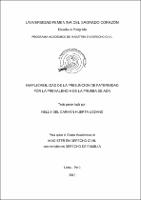| dc.contributor.advisor | Quezada Martínez, Teresa Liliana | |
| dc.contributor.author | Huerta Lozano, Nelly del Carmen | |
| dc.date.accessioned | 2016-09-22T22:14:01Z | |
| dc.date.available | 2016-09-22T22:14:01Z | |
| dc.date.issued | 2015 | |
| dc.identifier.uri | http://hdl.handle.net/20.500.11955/162 | |
| dc.description.abstract | En nuestros días es frecuente encontrar niños y niñas nacidos dentro de un matrimonio, cuyo padre no es el marido de la madre. Esto supone la existencia de niños y niñas que formalmente (o legalmente) tienen por padre al marido de la madre, en función de la regla de presunción de paternidad contenida en nuestro código civil. El padre que no se considere tal, puede negar esta paternidad (esta acción se encuentra reservada al marido y al propio hijo cuando alcance la mayoría de edad). Sin embargo el padre biológico no se encuentra facultado por ley para interponer esta acción contestatoria de paternidad. Es estos tiempos, con el avance de la ciencia se puede afirmar que a través de la prueba de ADN se puede demostrar la verdadera filiación de una persona. Esta prueba biológica, ha dado certeza a la filiación y a la identidad del niño. Lo que pretendemos plantear en este trabajo de investigación, es la creación de mecanismos que permitan ampliar la titularidad de la acción contestatoria a la madre y al padre biológico ya que deben prevalecer las relaciones de paternidad biológicas frente a la protección de vínculos irreales que vulneran el derecho a la identidad. | es_PE |
| dc.description.abstract | Nowadays it is common to find children born in wedlock, whose father es not the husband of the mother. This implies the existence of children who formally (or legally) have as father the mother`s husband, according to the rule of presumption of paternity contained in our Civil Code. The father who does not consider himself as father, can deny this paternity (this action is reserved to the husband and the child himself when he reaches adulthood). However the biological father es not authorizad. In these times, with the advancement of science we can say that DNA testing can demonstrate the true parentage of one person. This biological test has given assurance to filiation and identity of the child. The presente research intends to raise, the creation of mechanisms to broaden the entitlement of the statement of defense to the biological mother and father since the biological relationships of paternity must prevail before the protection of unrealistic links that infringe the right to identity. | es_PE |
| dc.description.uri | Tesis | |
| dc.format | application/pdf | es_PE |
| dc.language.iso | spa | es_PE |
| dc.publisher | Universidad Femenina del Sagrado Corazón | es_PE |
| dc.rights | info:eu-repo/semantics/openAccess | es_PE |
| dc.rights.uri | https://creativecommons.org/licenses/by-nc-nd/4.0/ | es_PE |
| dc.source | Repositorio Institucional - UNIFÉ | es_PE |
| dc.subject | Paternidad (Derecho) | es_PE |
| dc.subject | Derecho--Tesis | es_PE |
| dc.title | Inaplicabilidad de la presunción de paternidad por la prevalencia de la prueba de ADN | es_PE |
| dc.type | info:eu-repo/semantics/masterThesis | es_PE |
| thesis.degree.name | Magíster en Derecho Civil con mención en Derecho de Familia | es_PE |
| thesis.degree.grantor | Universidad Femenina del Sagrado Corazón. Escuela de Posgrado | es_PE |
| thesis.degree.level | Maestría | es_PE |
| thesis.degree.discipline | Derecho Civil con mención en Derecho de Familia | es_PE |
| dc.subject.ocde | https://purl.org/pe-repo/ocde/ford#5.05.01 | es_PE |
| renati.advisor.dni | 07457376 | |
| renati.advisor.orcid | https://orcid.org/0000-0002-7577-1059 | es_PE |
| renati.author.dni | 08776262 | |
| renati.discipline | 422067 | es_PE |
| renati.juror | Quezada Martínez, Teresa | es_PE |
| renati.juror | Ledesma Narváez, Marianella | es_PE |
| renati.juror | Bramont-Arias Torres, Luis Felipe | es_PE |
| renati.juror | Campos Arenas, Agustín | es_PE |
| renati.level | http://purl.org/pe-repo/renati/level#maestro | es_PE |
| renati.type | http://purl.org/pe-repo/renati/type#tesis | es_PE |
| dc.publisher.country | PE | es_PE |


